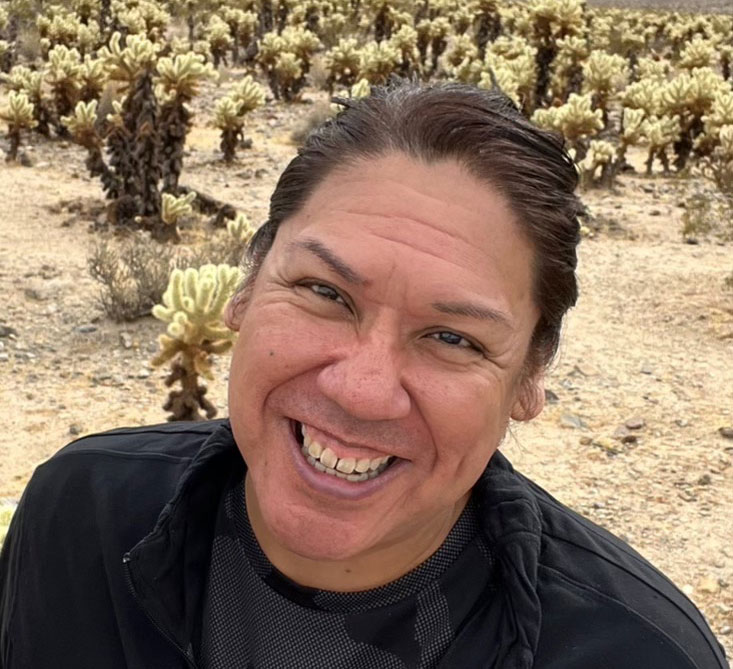
December 2023 Vol.2 Issue 9
Welcome Message
Teaching excellence
This issue is specifically for those who teach at JIBC, and that includes a wide variety of types, from the infrequent remote instructor to the full-time regular individual who is on one or all of the campuses all the time to the online undergrad instructor juggling teaching gigs between post secondaries to the trainer who volunteers their time in the interests of public safety around the province to the administrator who teaches the odd class in their program area to help fill the gaps. We take all kinds at the JIBC, which poses its own unique challenges when we think about holding this conversation broadly to “JIBC faculty”.
What we share, I hope, is an interest in being a good educator and in using our skills to supplement our subject matter expertise to become a good shepherd of learning among our charges, be they students, trainees, recruits, practitioners, volunteers…learners.
Teaching and its close, but less-well-recognized, cousin facilitation are often seriously underrated as skills, even in an educational institute. We prioritize subject matter knowledge and expertise as the primary requirements for our educators, and that is not surprising or even wrong. It is a critical requirement of the job. However, we have learned through the research and our collective experiences that the most well informed and knowledgeable do not always make for the best instructors. Subject matter knowledge is not enough, and we should not assume that great teaching comes with vast knowledge and/or experience. This is the premise of faculty development.
To be excellent educators, it helps to look across the room at our learners and be able to imagine what is going on in those minds as well, not just our own. In this way, we need to develop knowledge in concepts that are tied to the experiences of our learners, like learning and motivation and behaviour. We want to understand how information and experiences affect not only cognitive processes but also emotional responses. We also need to see learning as an experience that may begin with the individual mind but that continues outward to the group and by extension to the communities we are part of. What are the important connections that learning supports, amongst those in the classroom and well beyond? How can we find safe spaces of commonality of purpose and interest while recognizing and celebrating differences within those same groups? It gets complicated fast.
Excellent educators need to develop skills that can help us work with those diverse sets of learners. The goal is not simply to communicate information from one individual (the expert) to everyone else in the room. It is much more ambitious; it is to help others develop their subject matter knowledge and skills while expanding their networks so that they can make a difference in the realm of public safety.
What does the road to effectiveness and excellence look like? There are many ways to become better at teaching and facilitation; the responsibility lies with instructors and program staff to learn more about teaching and learning, but it is incumbent upon the institute to support those efforts and make them more of a collective rather than individual effort. The Centre for Teaching, Learning and Innovation (CTLI) is here to support those efforts as well as identifying possible routes forward. According to the Professional and Organizational Development (POD) Network in Higher Education, a thriving teaching and learning centre is critical to the success of faculty development in higher education (Wright et al., 2018).
So this issue considers what it takes to be a great educator, excellent instructor, skilled facilitator, etc. We want to explore how one develops from their practitioner self to the educator. For those who are still learning on their journey as an educator (and that is pretty much everyone because when does one stop learning?), this issue offers a few ideas, some fabulous words of wisdom, and a lot of encouragement to keep going. At JIBC, this is our core business, so let’s give it the attention it deserves.
References
Wright, M., Volpe Horii, C., Felten, P., Dean Sorcinelli, M., Kaplan, M. (2018). Faculty Development Improves Teaching and Learning. PODSPEAKS. Professional and Organizational Development Network. https://podnetwork.org/content/uploads/POD-Speaks-Issue-2_Jan2018-1.pdf

Land Acknowledgement
We would like to acknowledge that we work from the New Westminister campus which is located on unceded traditional territories of the Qiqéyt (Qayqayt), xʷməθkʷəy̓əm (Musqueam) and Coast Salish Peoples. This is a land where the river meets the great sea and the mountains overlook the vast and fertile valleys. This is a land of confluence and crossovers, connecting people, cultures, and ideas. We are grateful to learn about the history of these lands and to join in new traditions.
THURSDAY DROP-IN
Happy Holidays! Drop-ins will return early January 2024.
Thursday@ 12:00 pm – 1:00 pm
Our weekly drop-ins will be taking a place online via Collaborate. Open in Chrome or Firefox. Ensure to enable microphone and camera when prompted.
Shout Outs: Congratulations!
This issue is about excellent educators and we are thrilled to feature a couple of colleagues who have been recognized for their recent important work. Congratulations!

Mégcen Tskwínek Heather Simpson, our Senior Advisor at the Office of Indigenization at JIBC, was recently recognized by Douglas College as one of their Alumni35 award winners. According to the Douglas site, “the Alumni35 award recognizes Douglas College alumni who, either through their career, life’s work or passion project, are using their skills and knowledge to adapt, innovate and lead in our ever-changing world.” While Heather may have studied at Douglas, we are indeed lucky to have her as a leader in our JIBC community. Heather is the embodiment of the excellent educator, whether she is teaching or advocating for change in our practices or supporting staff and program areas with her ideas and passion. Way to go, Heather!

Gerald Bent is one of our Liberal Studies instructors who teaches the course SOCI-1100 Reconciling Colonial Practices in Justice and Public Safety. When not teaching at JIBC and Kwantlen, Gerald works for Corrections Canada as a Correctional Programs Officer. Earlier this month, Gerald defended his MA thesis at the University of Northern BC. His research has focused on the Indigenous Restorative Justice (RJ) program in the Nlaka’pamux Nation, which is home to Gerald. According to witness accounts from his defence, Gerald sailed through his defence, receiving unbridled praise from his supervisory committee for his insights, his love and respect for his community, and his thoughtful analysis of the practices of restorative justice. At the Learning Hub, we knew Gerald was worth talking to, so we interviewed him about his teaching and the challenges of working as an online instructor in one of our recent podcast interviews at the Learning Hub. Congratulations Gerald!
Goodies from CTLI
With every issue of our Learning Hub, we imagine you reading it with a soundtrack (because aren’t we all just main characters in our very own movie?). Here’s this issue’s mixtape, curated by our very own Dave. Enjoy!
Featured Articles
Podcast: Episode 5 - Teaching and Facilitation Excellence
Our newest episode showcases two amazing faculty at JIBC Georganne Oldham and Kathryn Thomson, from the Centre of Leadership. Join them, alongside Dave, for a rich conversation that will leave you with some practical tips and examples you can apply to your own teaching in the future.
Top Qualities of an Excellent Instructor/Facilitator
When it comes to improving your practice as an instructor, it’s hard to know where to start. At CTLI, we brainstormed a few qualities that we felt exemplified the excellent instructor and tried to match those qualities with some resources to follow up with. This list is not exhaustive, but it will certainly give you plenty to think about
Voices from JIBC
For this issue on teaching excellence, we asked our community:
What do you consider to be the top qualities of an excellent instructor? What do you do to improve your teaching and facilitation practices?
Below are their recommendations.
 Instructor, Adult Probation Officer Training
Instructor, Adult Probation Officer Training
Been teaching for 2 years
What do you consider to be the top qualities of an excellent instructor?
Fluidity. The ability to take challenges in stride and laugh at your own mistakes. These qualities help build rapport with students as they see you as more than just someone standing in the front of the room.
What do you do to improve your teaching and facilitation practices?
Reflection. What worked? What almost worked? What would I like to do differently next time?
Instructor, Disaster & Emergency Management
Been teaching for 1 month in an academic setting
What do you consider to be the top qualities of an excellent instructor?
Subject matter expertise, communication skills, and the ability to empower and motivate students.
What do you do to improve your teaching and facilitation practices?
Professional development courses, reflect on my teaching practices, and diversify instructional materials.
 Instructor, Adult Probation Officer Training
Instructor, Adult Probation Officer Training
Been teaching for 2 years
What do you consider to be the top qualities of an excellent instructor?
It is easy for new staff to become bogged down in the details and intricacies of the Probation Officer job. For this reason, it is exceedingly helpful for instructors to enable staff to keep a macro level perspective about our overarching role and perspective. In doing so, staff are better equipped to understand the context and why we are completing each complex task.
If you consider the amount of people influenced by all the individuals in training at the JIBC, the number is incredible. Staff, recruits, and trainees will travel back to all corners of this vast province to serve their communities. Many of the roles represented at the JIBC have well-documented challenges. For this reason, it is paramount for instructors to find creative ways to inspire these staff in training. This will develop a collective resilience to navigate any impending challenge and maintain meaningful and excellent service.
What do you do to improve your teaching and facilitation practices?
- Engage in learning and educational opportunities.
- Receive and offer feedback.
- Facilitate atmospheres where all students feel welcome to share their own knowledge and expertise.
- Strive to maintain and demonstrate a posture of learning from the training staff. We are all teachers and learners in tandem.
Dean, Community & Social Justice Division
Conflict Resolution, Leadership
Been teaching for 23 years
What do you consider to be the top qualities of an excellent instructor?
Humility, passion for humanity, immersion in the subject area, caring for the student experience, respectful challenge, ability to connect dots between student comments and course learning outcomes. Never saying, “No, that’s wrong…”
What do you do to improve your teaching and facilitation practices?
Co-teach, read articles, look at YouTube videos, try to simplify.
Instructor, Family Justice
What do you consider to be the top qualities of an excellent instructor?
In addition to being a subject matter expert, an instructor needs to be humble, curious about each student’s perspective and point of view, and courageous to say, ”I don’t know; let’s look it up together.” A lot of it is about relationship building, mutual respect and trust.
What do you do to improve your teaching and facilitation practices?
I see this as two sides of the coin. On one side, trying to stay current with the subject matter, technical knowledge as well as the competencies required to support adult learners. Another and equally important element here is the Indigenous lens – reminding myself that the learning/teaching experience is a journey; it is unique to each individual and goes well beyond the course content/assignments/course credit.
What can we do as part of our JIBC community to support teaching excellence?
Continue being cutting edge in technology use and immersing ourselves with and learning from our Indigenous communities, leaders, and scholars. Also, learning from others who might have different worldviews than us (i.e., looking at how things are done not only in the UK, USA or Australia but also in places like Brazil, Korea or Germany).
Program Director, Justice & Public Safety Division
Criminology, Sociology, and Communications
Been teaching for 23 years
What do you consider to be the top qualities of an excellent instructor?
In the end, I think it is all about being deeply intentional about what it is you want to accomplish and then about ensuring that the ends are inherent in the means. More than anything else, I strive to build community in and out of the classroom and try to cultivate a collective sense of care and shared sense of mission (at least at the metalevel, anyway).
What do you do to improve your teaching and facilitation practices?
Reflective practice, pairing and sharing with other instructors, asking for feedback from students, projective imagination is also important, and finally, professional development and self-care are bedrock.
Featured Articles
Studio 23: Reignite Your Teaching and Facilitation Practice -- a Recap!
We went to a conference dedicated to learning more about the world of teaching and learning. Here’s what happened. Read more

Resources

What's new in the Library: Journal of Faculty Development
The Journal of Faculty Development is a peer-reviewed journal for academic professionals. Issued three times per year, it is a medium for the exchange of information regarding faculty development in post-secondary educational institutions.
Some of the themes offered in this journal include:
- Program Design
- Professional Development
- Innovative practices in the field of faculty development
- Curriculum and Leadership
- Higher Education Pedagogy
- Evaluation and Assessment
You can access the current and all back issues of this journal through the JIBC Library.
You can also sign up for a free account on the journal publisher’s site to get alerts for all the new articles.
Please get in touch with your Liaison Librarian if you need any help!
Other Resources
The following sites are great resources for improving their teaching and facilitation. Each offers practical advice and strategies to learn and apply to your courses.
JIBC Faculty Orientation Guide
One of the challenges for newer instructors is just trying to figure out how JIBC operates. Earlier this year, we developed a Faculty Orientation Guide to help instructors navigate the teaching and learning environment at JIBC. This guide is handy for new and experienced instructors.
Faculty Focus publishes three new articles per week on its website, which is open and free to all, so it is worth bookmarking if you still do that, though maybe it’s better to sign up for their newsletter. Articles are written by and for instructors on various relevant topics such as course design, teaching and learning, educational philosophy, and technology. An excellent source for those who want to keep abreast of developments in teaching and learning. For example, the series on effective teaching strategies offers numerous examples and suggestions for those wanting to bring more life and energy to their teaching.
This inventory was developed by Thomas Angelo, one of the authors of the invaluable book Classroom Assessment Techniques. If you need something to help you realign your teaching goals with your course, this tool is for you. It is very handy for course design projects when you want to get started and develop a clearer sense of your purpose for your students.
Patricia K. Cross Academy Engagement Strategies
There are lots of sites out there that describe teaching strategies for those who want to increase the levels of engagement with students. This is one of the best. The site outlines a number of strategies with explicit instructions how to set up active learning activities and apply them in your context. This site is closely related to the book Engaged Teaching: A Handbook for College Faculty by Elizabeth Barkley and Claire Howell Major.
This resource is recommended by one of our podcast guests, Kathryn Thomson, so you know it will be good. Liberating Structures are a series of active learning activities that you can employ in various combinations and are useful not only in the classroom but also for meetings and presentations. With a focus on active participant engagement, these Liberating Structures will supercharge your facilitation. LS has its own app that you can add to your phone to have these activities literally at your finger tips.
Do you want to improve your teaching as a BC adult educator? Well, you are in luck. There is an entire organization dedicated to supporting you in that endeavour. Check out all the opportunities for professional development, research, writing projects and gatherings with other interested and interesting folks from the BC post secondary scene. These folks can help you transform your teaching practice, and you will meet many great people along the way as well.
Call for feature:
Do you want to celebrate the success of a friend or colleague here in our world of teaching and learning at JIBC? Let us know and we’ll make a space on these pages.
The Learning Hub is a production of the good folks at the Centre for Teaching, Learning, and Innovation (CTLI). We welcome ideas and suggestions for edition themes and ideas for articles. Contact us at ctli@jibc.ca.









